The first violin edition of the Global Music Education League competition took place in Beijing following a four-year delay due to the pandemic. Emma Baker travelled to China to hear the finals
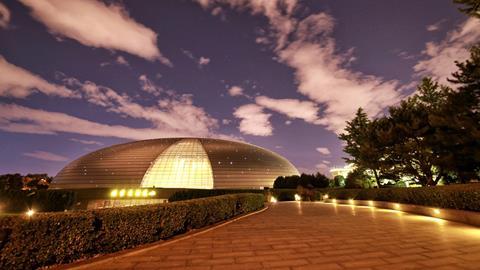
Discover more Featured Stories like this in The Strad Playing Hub.
Read more premium content for subscribers here
Winter in Beijing is bone-cold; the locals go about in long padded coats and teddy-bear hats, or zip around the busy streets on scooters and bicycles, their hands tucked into built-in mittens attached to their handlebars. Heavy plastic fringes hang down from doorways to shelter the interior from the bite of the wind. But the low winter sun sparkles through the ice-blue air and the colours on the buildings seem to glow.
This huge city was once infamously choked by pollution, but since the pandemic, it has been working hard to clean up its act and feels like a place reborn. One of the many other things that has re-emerged, post-pandemic, is the annual Global Music Education League (GMEL) competition. The very first edition, for piano, was held in May 2019, just before the world was stopped in its tracks by Covid. After a four-year hiatus, the inaugural violin edition took place from 3 to 13 November 2023.
The GMEL, the organisation behind the competition, was set up in 2017 by Professor Liguang Wang, composer and then-president of the China Conservatory of Music, in partnership with the University of the Arts Helsinki, the Sydney Conservatorium of Music and the Eastman School of Music (Rochester, NY). Its goal, according to its mission statement, is ‘to foster global music education’ and ‘build a world-class academic community’, among other things.
For this first violin edition, the GMEL assembled an impressive international jury comprising Bin Huang (chair), Giovanni Angeleri, Friedemann Eichhorn, Lorenz Nasturica-Herschcowici, Mariusz Patyra, Lucie Robert, Joel Smirnoff, Weidong Tong and Pavel Vernikov. Equally impressive was the fact that the Philadelphia Orchestra would be accompanying the concertos in the final, marking the 50th anniversary of its first visit to China in 1973. ‘It is a great demonstration of cultural exchange,’ Wang told me. Perhaps what stood out most, though, was the prize money – a potentially life- and career-changing $100,000 for the first prize winner.
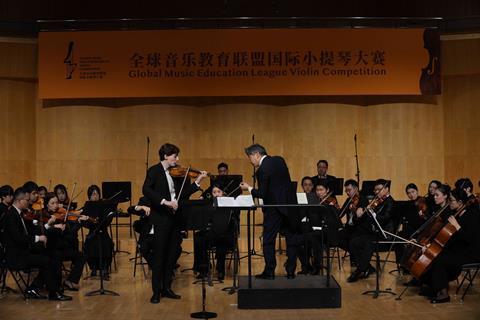
I arrived in Beijing to hear the first round of the finals on 11 November, when six finalists, whittled down from 20 international competitors, were required to play a Mozart concerto from a choice of nos.3, 4 or 5 accompanied by the China Conservatory Symphony Orchestra. This and previous heats took place in the state-of-the-art concert hall at the China Conservatory of Music in the north of the city.
First to play was Angela Sin Ying Chan, 26, one of two Chinese finalists, both of whom played the Fourth Concerto in D major. She performed with a sweet and confident tone, but suffered from being first on – the opening tempo dragged and she never quite regained her momentum. This clearly didn’t go unnoticed by Chaowen Luo, 22, who followed after having a word with conductor Xia Xiaotang, briefly beating time. It made all the difference, as his performance came to life in a much more three-dimensional way.
Third on was Elli Choi, 22, from the US, with the only account of Mozart’s Concerto no.3 in G major. From the start she was impressive. Her phrasing was thoughtfully shaped, and every note was imbued with meaning. It was a performance I’d have been happy to have paid to hear. Another standout was her compatriot Joshua Brown, 24, who chose the Fifth Concerto in A major. It was a confident and elegant account.
The two other competitors, 23-year-old SooBeen Lee from South Korea and 22-year-old Risa Hokamura from Japan also chose to play Concerto no.4 – they were both musical and competent, and I preferred Lee’s rendition, but by the fourth hearing of the same piece my somewhat jetlagged ears were finding it hard to distinguish between the finer points of interpretation.
Joshua Brown spun silky, weightless phrases that seemed suspended in time
It wouldn’t be much of a spoiler to say that at this point the two Americans stood head and shoulders above the pack. Both are seasoned contestants – most recently, Choi was one of the prizewinners in the 2022 Kreisler competition, and Brown in the 2022 contest in Indianapolis. They were also both playing exceptional instruments – Brown a Nicolò Amati c.1635–40, and Choi a 1698 Matteo Gofriller. So it was no surprise when they were both selected to play in the final, alongside the musical Luo. At that point, Choi was my clear favourite, and her poise and professionalism were particularly impressive given that she had been ill with food poisoning (according to one of the jury members) and had only just got back on her feet.
The actual final took place two days later in the packed concert hall of Beijing’s magnificent National Center for the Performing Arts. This otherworldly building – known as The Egg – was opened in 2007 in the heart of Beijing, close to Tiananmen Square and the 15th-century walled imperial palace complex the Forbidden City.
The finalists had, thankfully, picked three different concertos from a choice of warhorses. The Philadelphia Orchestra, however, turned out to be a relatively small contingent from the US ensemble, mixed in with members of the China Conservatory Symphony Orchestra, and under the baton of an assistant conductor, Tristan Rais-Sherman.
First on was Luo, who dispatched a very creditable Tchaikovsky Concerto in D major. Technically, it held no fears for him, and he was extremely competent musically, but it perhaps lacked the spark needed for that next, exceptional level.
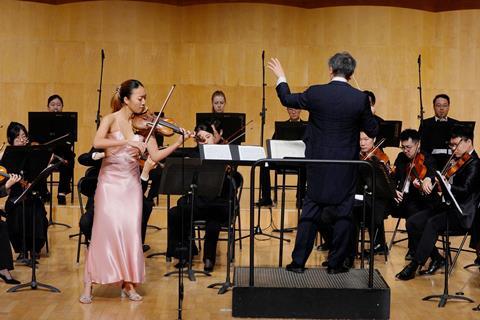
Next was Choi playing the Sibelius Concerto in D minor. She demonstrated the star quality I’d heard in her Mozart and was completely assured and confident in her technique and interpretation. However (and it pains me to say this), she was clearly uncomfortable in her concert dress. It was strapless, and though it looked perfectly secure, she kept hitching it up during the orchestral tuttis, sometimes with a rueful smile. I then remembered that she’d been unwell. Imagine the situation: you pack your best concert dress for a fortnight at an international competition, where you fall ill. A few days later you recover, but all your clothes are loose. It was a real bad-luck situation, and I felt for her.
Brown was the last to play, performing the Brahms D major Concerto. I’d managed to dip into a rehearsal the day before, and any concerns I’d had then about his tone being too slim were put to rest on the night. He was majestic in the first movement and dazzling in the third; but what was particularly memorable was his second movement, and how he spun out silky, weightless phrases that seemed suspended in time.
Again, it was no surprise when the prizes were announced: Brown in first place, scooping that astonishing cash prize of $100,000, Choi in second place with $65,000 and Luo in third place with a prize of $30,000.
I thought that either of the two US competitors could have taken the first prize, and the ultimate decision was down to their individual performances on the night. But what is heartening is that they are both not just experienced competition-goers who are good at handling the pressure, but also musicians with something special to say, and I look forward to seeing how their careers develop. It was certainly an auspicious start for what is a major new international event of the competition world.
Read: Postcard from Hong Kong: Musicus Fest
Discover more Featured Stories like this in The Strad Playing Hub.
Read more premium content for subscribers here
The number one source for playing and teaching books, guides, CDs, calendars and back issues of the magazine.
In The Best of Technique you’ll discover the top playing tips of the world’s leading string players and teachers. It’s packed full of exercises for students, plus examples from the standard repertoire to show you how to integrate the technique into your playing.
The Strad’s Masterclass series brings together the finest string players with some of the greatest string works ever written. Always one of our most popular sections, Masterclass has been an invaluable aid to aspiring soloists, chamber musicians and string teachers since the 1990s.
American collector David L. Fulton amassed one of the 20th century’s finest collections of stringed instruments. This year’s calendar pays tribute to some of these priceless treasures, including Yehudi Menuhin’s celebrated ‘Lord Wilton’ Guarneri, the Carlo Bergonzi once played by Fritz Kreisler, and four instruments by Antonio Stradivari.

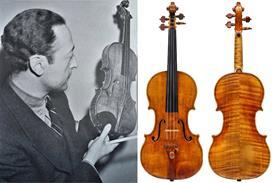
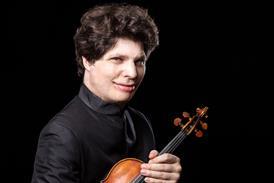

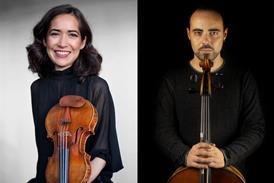

































No comments yet